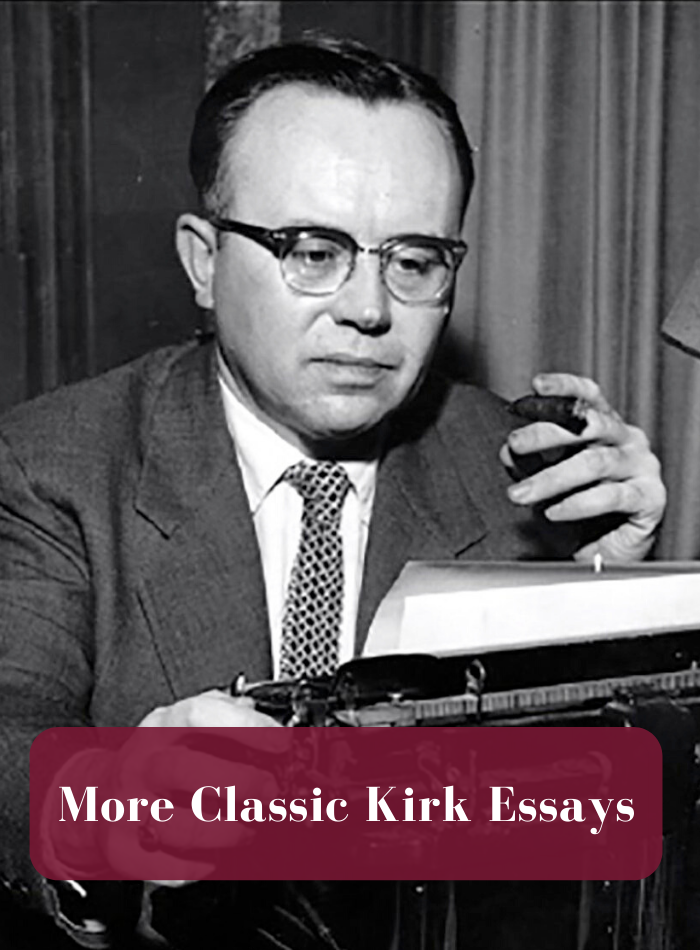Classic Kirk:
a curated selection of Russell Kirk’s perennial essays
“Here Comes the Choo-Choo!”
To The Point column, Los Angeles Times Syndicate, December 29, 1973.
Don’t tell me you can’t turn back the clock. It’s being done, in more ways than one, for our benefit. Take, for instance, the passenger train, pulled by a locomotive engine—even a steam locomotive.
Most folk thought that the railway train had been consigned to toy departments or to limbo. We have reared a whole generation of young people who never have traveled by train. Yet within two or three years, many readers of this column who now travel by plane or automobile will be riding the rails again.
I rejoice; for I was born almost literally in the railroad yards outside Detroit, the son of a locomotive fireman. I have traveled extensively by train in most states of this Union, and in perhaps 20 European and African countries. It’s the safest mode of transportation, and the most commodious, and the most reliable. More to the point, just now, a railway train expends far less energy per passenger than does automobile, plane, or even bus.
The British government has waked to this truth. Just the other day, that government suspended most of its costly and destructive plans for more big highways, and allotted a good deal of money to the improvement of British railways. Eventually, I believe, Britain will find it necessary to restore many of the lesser railway lines that had been abandoned during the past decade. For Britain still has plenty of coal, but produces little petroleum—despite the discovery of large oil fields beneath the seas off the Scottish coasts. . . .
Within a short time, I predict, even gloomy Amtrak will be profitable and much patronized. Relatively few people realize that rail travel can consume no more time, really, than does flying.
It is possible to travel by rail from Chicago to Detroit, say, on a nonstop train, downtown to downtown, as quickly as one can get there by plane—allowing for the tedious trips to and from the airports by car or bus, the delays with baggage, and all that. And one gains very little in time, say, by flying from New York to Washington, such factors considered.
For that matter, a night train between Chicago and Denver gets you to your destination rested and ready for business—when otherwise you would have been sleeping in some hotel, perhaps, actually losing time. The run between Los Angeles and San Francisco could be revived to similar advantage. About the only well-patronized long runs that remain to us just now are the trains between Boston and Washington; these can be immensely improved and extended.
Many shorter runs soon will be in business again, particularly those between a state’s biggest city and that state’s capital, much to the advantage of us all, civil servants included: these will save time and money, as well as energy. Philadelphia and Harrisburg, New York and Albany, Detroit and Lansing, Chicago and Springfield, New Orleans and Baton Rouge, Norfolk and Richmond—those and many similar rail connections should prosper.
Lines between urban centers and the suburbs had been shriveling in recent years, even around New York, Boston, Philadelphia, and Chicago; but now the commuters will begin to travel far more safely and less exhaustingly, once more, by train instead of car. Cleveland’s rapid transit systems, with swift and frequent electric trains to the principal suburbs, will be emulated.
Among the beneficiaries of this revived mode will be the big handsome downtown hotels near railway stations—or such of them as haven’t been demolished during the past decade. Flashy motels on the city’s fringe, on the other hand, will go bankrupt, as the process develops.
Diesel locomotives are far less wasteful to operate, loads and capacities considered, than are planes and automobile vehicles. But as we are pinched for liquid fuels, we may find it difficult to secure enough oil for those trains. So the coal-burning locomotive, the genuine cheerful choo-choo, may rejoice American children again. America’s coal reserves are great, and can be extracted more efficiently than in the past.
The Teamsters may expect to mourn, and the railway brotherhoods may count on regaining their old status as “the aristocracy of labor.”
Whistling and puffing from the railway yards was the most familiar sound that cheered my youth. Now my little daughters may inherit that delectation. It has been nearly half a century since the last passenger train puffed up the branch line to my ancestral village of Mecosta, Mich. The station at Mecosta has vanished; the rails and ties were carried off long ago; the very rail bed has reverted to farmers. If and when the resurrected Mecosta Express arrives from Saginaw, we shall have the perfect demonstration that nothing in history is inevitable: it is quite possible to turn back clocks which have been running too fast.
